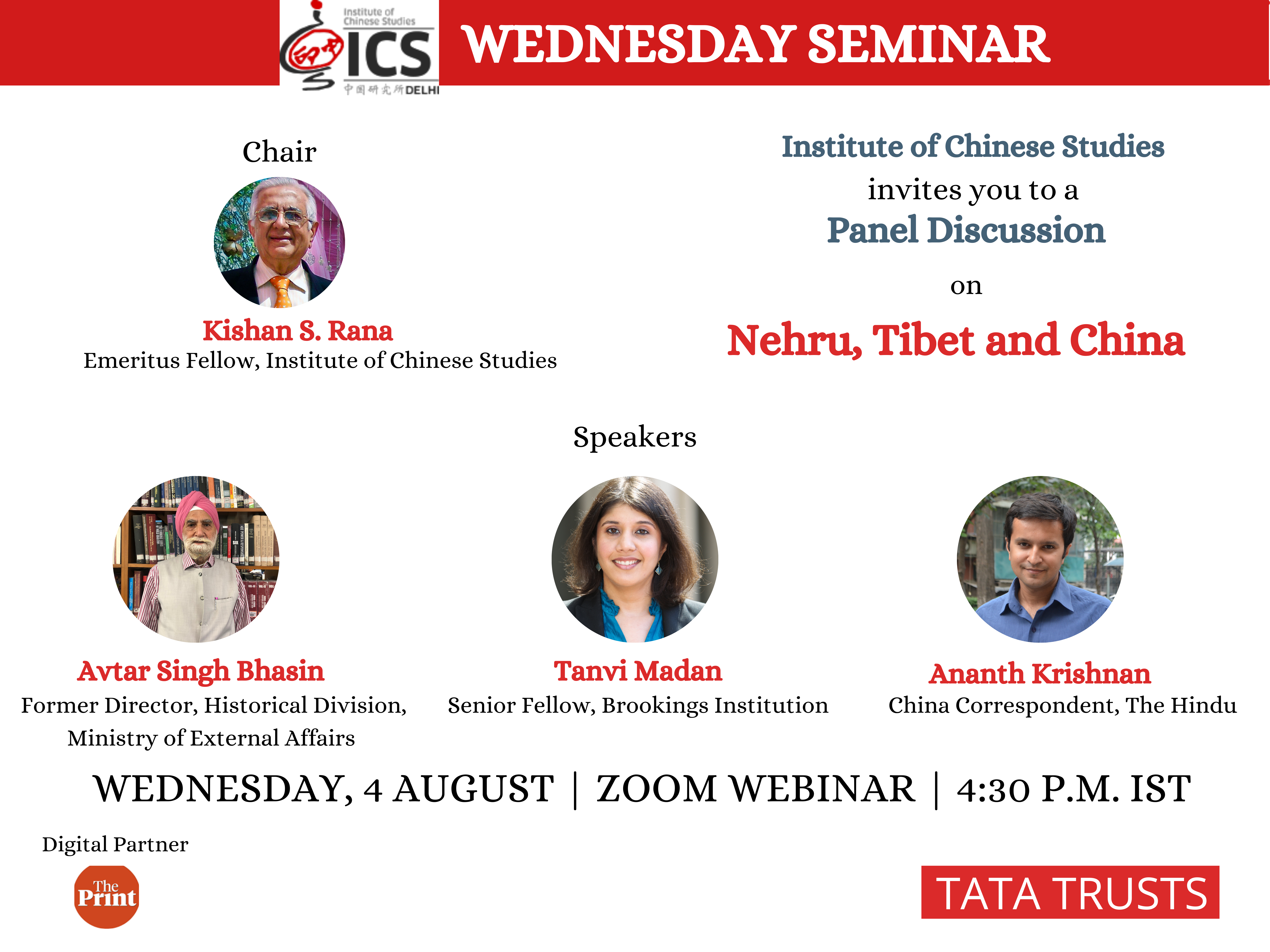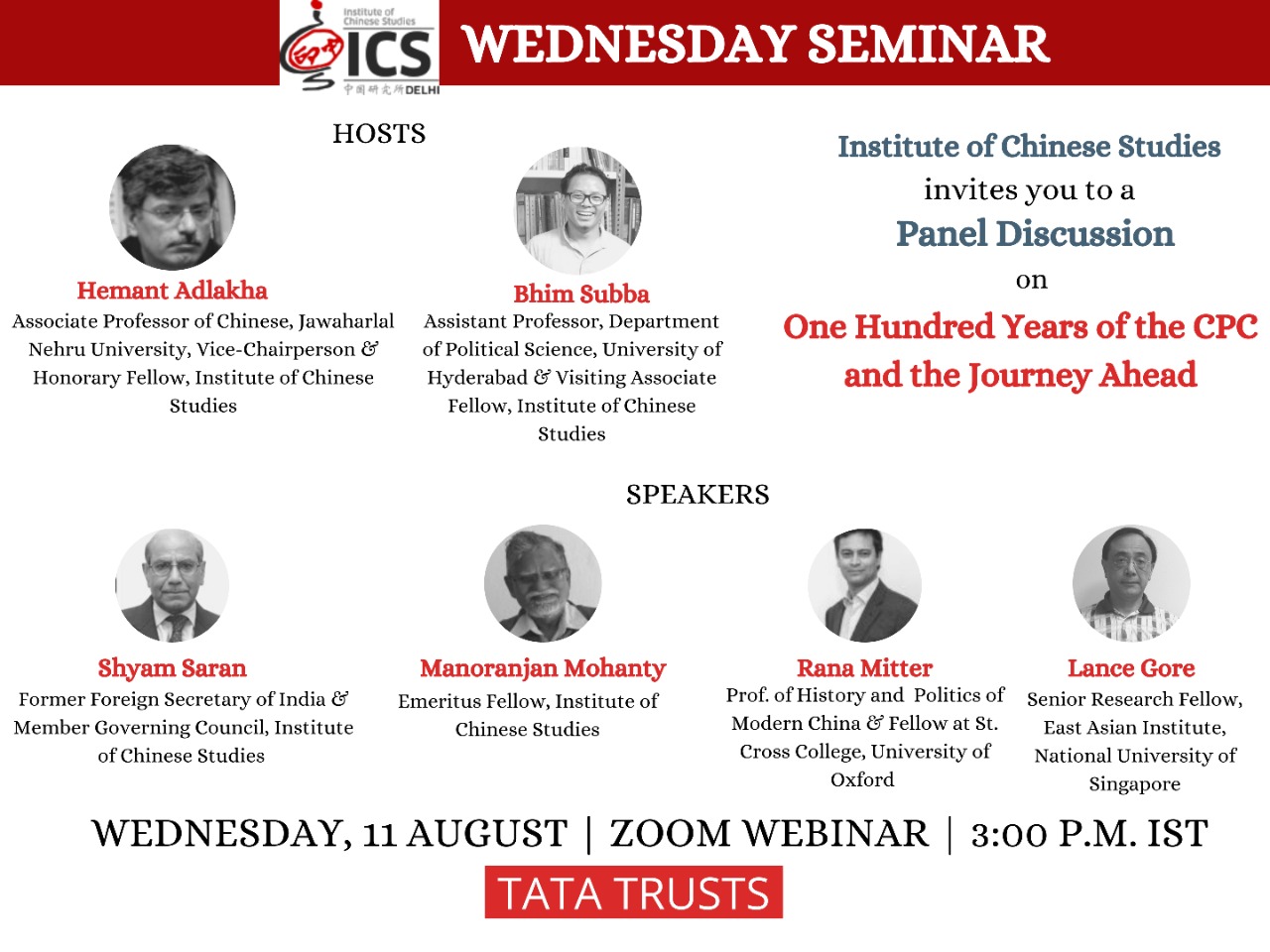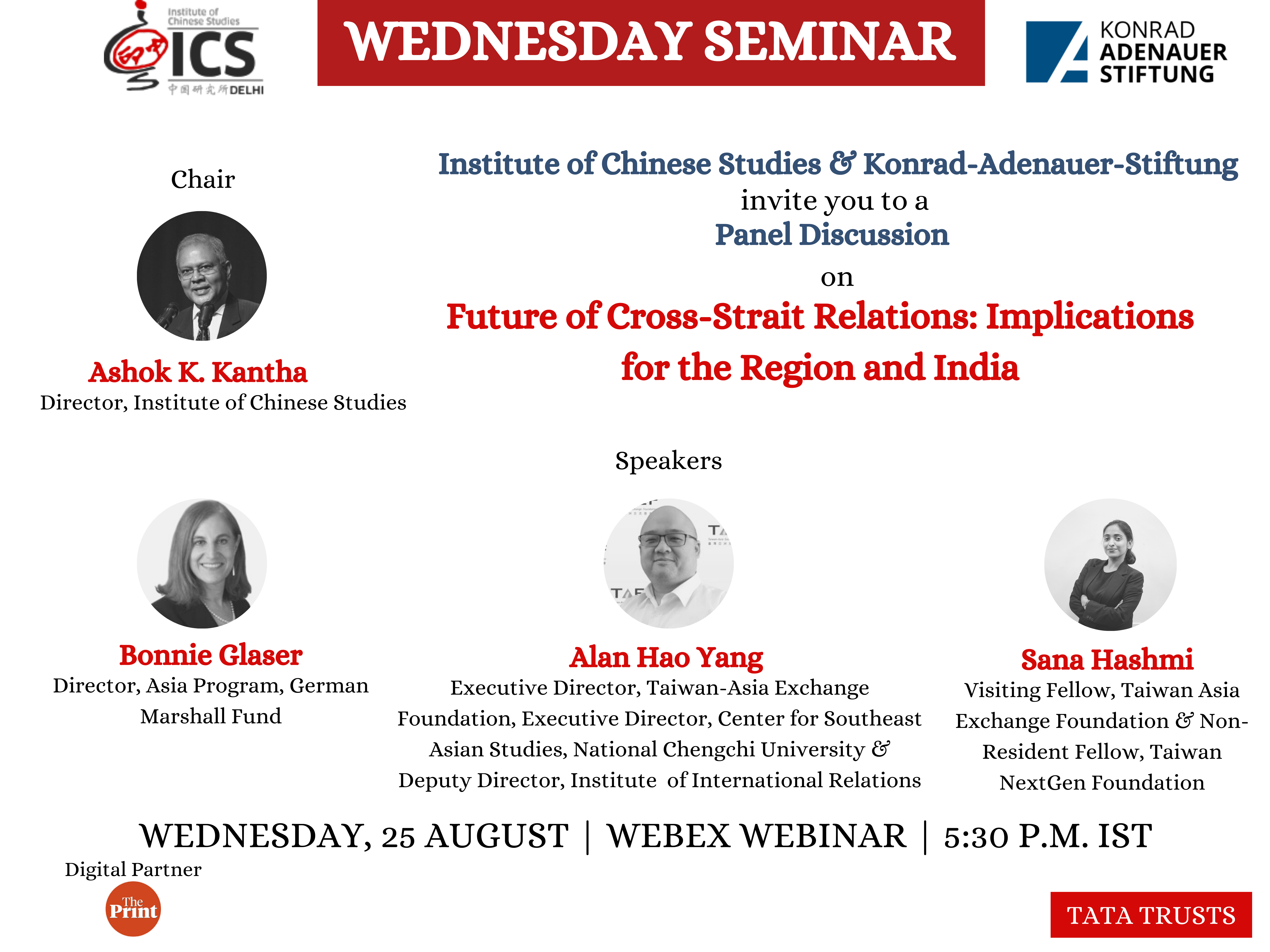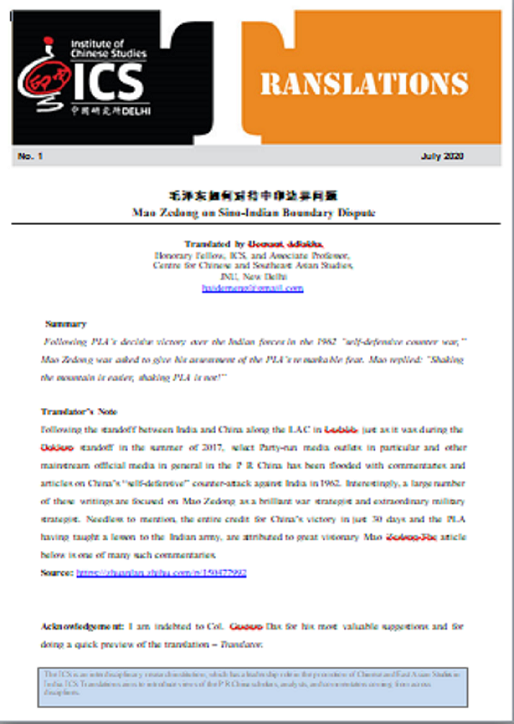 |
| |
| Nehru, Tibet and China |
|
Avtar Singh Bhasin, Tanvi Madan, Ananth Krishnan
Wednesday Seminar | Zoom Webinar |4 August 2021
|
| |
|
In his latest book, Nehru, Tibet and China, A.S. Bhasin seeks to challenge the conventional narrative handed down since the fifties of last century that China was perfidious and stabbed India in the back, while India promoted China's interests both bilaterally and internationally. By examining archives from the period, the author provides a new narrative about what transpired before and ultimately led to the 1962 War between India and China. In this seminar,the discussants have provided their comments on the book as well their expert understanding of the current scenario on the India-China border. The speakers also provided varying perspectives on the rapidly changing geopolitical context in South Asia, particularly India-China relations.
|
| Listen> |
|
|
 |
| |
| One Hundred Years of the CPC and the Journey Ahead |
|
Shyam Saran, Lance Gore, Manoranjan Mohanty, Rana Mitter
Wednesday Seminar | Zoom Webinar |11 August, 2021
|
| |
|
The clandestine grouping of a dozen young Chinese intellectuals this month a century ago in Shanghai has magnified into an event of world historical significance. Beaming with the spirit of “nationalism” never seen before in the preceding several decades of the struggle of the people of China against foreign imperialist domination and the corrupt, oppressive imperial rulers at home, the secret group with ten odd delegates representing fifty founding members has today evolved into the world’s largest ruling communist party with 95 million members. Scholars and observers both within mainland China and internationally, as also in the mainstream global press, have been debating the century-long journey of the CPC offering differing perspectives and varying interpretations. While Marxist debates have critically looked at the CPC journey through the ideological lens, and in the process highlighted several crucial and pertinent issues, namely a) within China, scholars have emphasized on the importance of holding on to Marxism-Leninism and never to lose the connect between the Party and the masses (drawing lessons from the collapse of the Soviet Union); b) ideological discourse within the ranks of diverse Marxian schools of thought has been in the range of contrasting the revolutionary founding principles at the party's opening congress in July 1921 with the “missing” Chinese people’s struggle against neoliberal finance capital-led class oppression globally and against (the US) imperialist domination; c) last but not least, there is the CPC invented so-called “socialism with Chinese characteristics” theoretical formulation which some dismiss as nothing but falsifying the ruling party’s socialist credentials as also witnessed during the grand fireworks as part of the centenary celebrations on July 1 with focus on “great rejuvenation of the Chinese nation” as the central element in Xi’s “Chinese Dream” campaign. At the same time, in the mainstream international press, including here in India, the CPC completing a hundred years is being analyzed in terms of the growing personality cult and larger-than-life authoritarian style of Xi Jinping, the “great leader” on one hand, and the People's Republic of China’s growing ambition to become "imperial" power, on the other. This seminar shed light on these issues with a contemporary lens.
|
| Watch> |
|
|
 |
| |
| Shifting Gears of China’s Post-Covid Economy |
|
Hans H. Tung, Mareike Ohlberg, Nivedita Rao Kommineni, Priyanka Pandit
Wednesday Seminar | Zoom Webinar |18 August, 2021
|
| |
|
The pandemic has accelerated prevailing trends and triggered new ones in China. Erosion of Deng-Era institutions has led to centralization of power and coloured China’s response to the pandemic. An emphasis on ‘dual circulation’ and boosting domestic consumption to reduce reliance on exports will impact China’s position in global supply chains. A pivot towards self-sufficiency in face of US-China tensions will prioritize high technology capabilities. The clampdown on homegrown technology giants even as digitization gains prominence will significantly impede their global ambitions. Industry players worldwide will need to re-adjust their global strategies to account for these new realities as geopolitics takes a prominent seat in boardrooms. Debates around re-shoring, de-coupling and dependency will continue long after the pandemic abates. This panel discussion combined policy, sectoral and global perspectives to take stock of the predicament.
|
| Read More> |
|
| |
 |
| |
| Future of Cross-Strait Relations: Implications for the Region and India |
|
Bonnie Glaser, Alan Hao Yang, Sana Hashmi
Wednesday Seminar | Webex Webinar |25 August, 2021
|
| |
|
As the Indo-Pacific construct evolves, it is important to look at how this set of relations and its future hold relevance for the like-minded countries in the Indo-Pacific region and what could these countries do to minimise the threat emanating from the rising tensions between China and Taiwan. Whether cross-strait relations improve in the future depends on policies adopted by the PRC, Taiwan and to some extent, the United States. Thus, delineating strategic currents in the Cross-straits relations requires an analysis of dynamics in the Indo-Pacific along with the development of Taiwan as a resilient stakeholder in the context of post-Covid 19 pandemic recovery. With Beijing unlikely to soften its demand that any leader of Taiwan recognizes that Taiwan is a part of China, cross-strait tensions will persist, and likely increase and China will step up actions to punish, coerce, and isolate Taiwan. In such a situation, democracies should make greater efforts unilaterally and multilaterally to support Taiwan, in part to strengthen deterrence. In this context, the speakers discussed the implications for the region and where India’s interests lie.
|
| Listen> |
|
|
|
|
|
 |
|
|
 |
| ICS Analysis |
| |
Beijing thinks India is the ‘Weakling’ in Quad
|
| Hemant Adlakha | Issue No. 135 | August 2021 |
| |
| “Quad” was first laughed at in Beijing as a “beggar’s club,” then denounced as Cold War mindset. Analysts globally, especially in Beijing, have been describing India as the outlier among the four nations. India’s failure in effectively tackling the second wave of Covid-19 and creating chaos in procuring and distributing vaccine across the country has “battered India’s ambitions to become the ‘pharmacy of the world’.” In the context of India’s Quad ambitions, the global media is dismissive of the US high expectations for New Delhi playing a leading role in countering China in the Indo-Pacific region. But some critics are not yet ready to undermine the Indian potential to emerge as the Quad keystone in the long run. Is India really the weakest link or the country will eventually become the keystone in the quartet? |
| Read more >> |
|
|
 |
| ICS Occasional Paper |
| |
Demographic U Turn in China: Xi Jinping’s Vision 2035 and the Three Child Policy
|
| Poonam Surie |Issue Issue No. 76 | August 2021 |
| |
| China’s Census 2020 has clearly revealed the demographic trend that has been noticed for the last few decades, that of an ageing population in China. For a vision that Xi Jinping has, of a country which is technologically advanced, and of a developed Chinese economy with industrialization, enhanced military capabilities, an eco- friendly way of life with declining carbon emissions by 2035 and a declining rural urban divide, it is of paramount importance that the workforce should be able, agile, productive and contribute to the ‘dual economy’. The GDP is targeted to reach that of moderately developed countries; and reducing regional disparities, modernizing industrial supply chains and improving the infrastructure are some of the other considerations which are a part of the vision, including the dual circulation strategy, part of which relies on domestic consumption. |
| Read more >> |
|
|
 |
| ICS Translations |
| |
'Involution, acceleration and the "Making Out" Game of the Contemporary Chinese Society'
|
| Madhurendra Jha | Issue No. 34 | August 2021 |
| |
| If one were to select a topical vocabulary of the year 2020, then “involution” would certainly be found in that list. Earlier used as an academic jargon entangled in the witchcraft sort of academic discourse within a small range of academic circle, involution suddenly had an “exvolution” in the year 2020, becoming a cultural phenomenon popular among the crème university students and the middle class. In the current online discussions in China, involution has already become a vocabulary with an extensive meaning, leading to the “everything is involution” phenomenon. However, these discussions mostly use involution as the “description of a miserable condition”. They focus upon expressing a common anxiety prevalent in the current Chinese society, but lack the analysis of the causality behind the issue. |
| Read more >> |
|
|
| |
|
|
|





